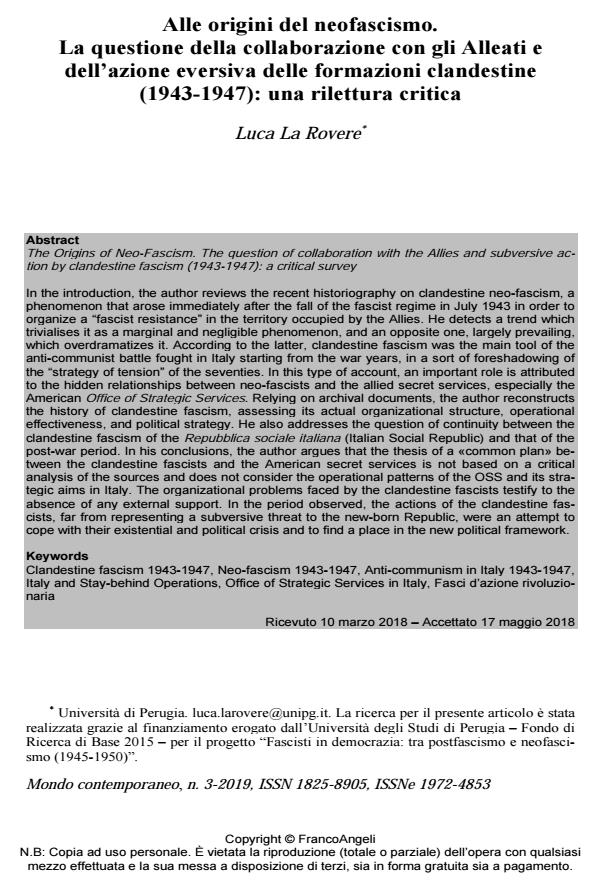The Origins of Neo-Fascism. The question of collaboration with the Allies and subversive action by clandestine fascism (1943-1947): a critical survey
Journal title MONDO CONTEMPORANEO
Author/s Luca La Rovere
Publishing Year 2020 Issue 2019/3
Language Italian Pages 61 P. 31-91 File size 507 KB
DOI 10.3280/MON2019-003002
DOI is like a bar code for intellectual property: to have more infomation
click here
Below, you can see the article first page
If you want to buy this article in PDF format, you can do it, following the instructions to buy download credits

FrancoAngeli is member of Publishers International Linking Association, Inc (PILA), a not-for-profit association which run the CrossRef service enabling links to and from online scholarly content.
In the introduction, the author reviews the recent historiography on clandestine neo-fascism, a phenomenon that arose immediately after the fall of the fascist regime in Ju-ly 1943 in order to organize a "fascist resistance" in the territory occupied by the Allies. He detects a trend which trivialises it as a marginal and negligible phenomenon, and an opposite one, largely prevailing, which overdramatizes it. According to the latter, clandestine fascism was the main tool of the anti-communist battle fought in Italy start-ing from the war years, in a sort of foreshadowing of the "strategy of tension" of the seventies. In this type of account, an important role is attributed to the hidden relation-ships between neo-fascists and the allied secret services, especially the American Of-fice of Strategic Services. Relying on archival documents, the author reconstructs the history of clandestine fascism, assessing its actual organizational structure, operational effectiveness, and political strategy. He also addresses the question of continui-ty between the clandestine fascism of the Repubblica sociale italiana (Italian Social Re-public) and that of the post-war period. In his conclusions, the author argues that the thesis of a «common plan» between the clandestine fascists and the American secret services is not based on a critical analysis of the sources and does not consider the operational patterns of the OSS and its strategic aims in Italy. The organizational prob-lems faced by the clandestine fascists testify to the absence of any external support. In the period observed, the actions of the clandestine fascists, far from representing a subversive threat to the new-born Republic, were an attempt to cope with their existen-tial and political crisis and to find a place in the new political framework.
Keywords: Clandestine fascism 1943-1947, Neo-fascism 1943-1947, Anti-communism in Italy 1943-1947, Italy and Stay-behind Operations, Office of Strategic Services in Italy, Fasci d’azione rivoluzionaria
- Il Movimento sociale italiano in Toscana, dalla nascita al congresso di Viareggio. Appunti per una ricerca Michelangelo Borri, in SOCIETÀ E STORIA 179/2023 pp.63
DOI: 10.3280/SS2023-179004
Luca La Rovere, Alle origini del neofascismo. La questione della collaborazione con gli Alleati e dell’azione eversiva delle formazioni clandestine (1943-1947): una rilettura critica in "MONDO CONTEMPORANEO" 3/2019, pp 31-91, DOI: 10.3280/MON2019-003002